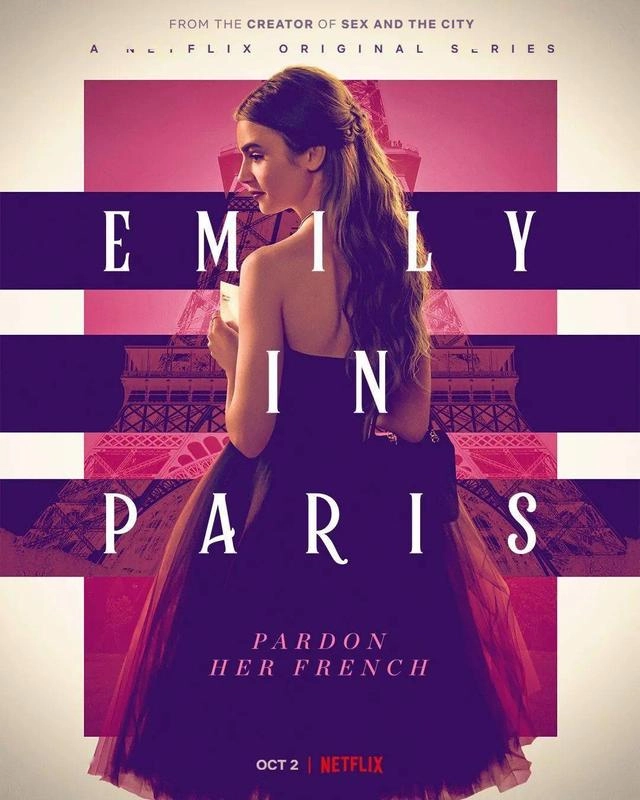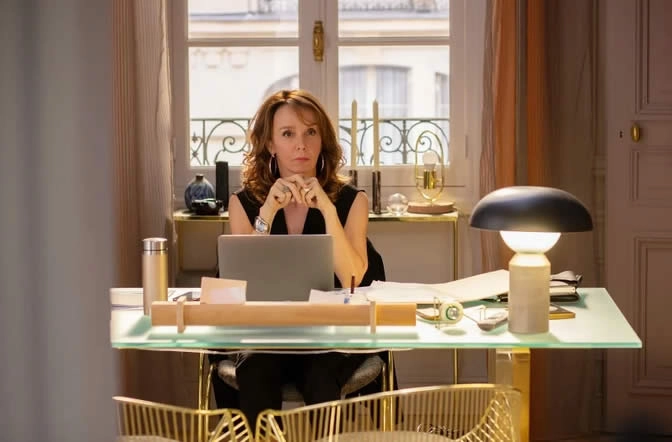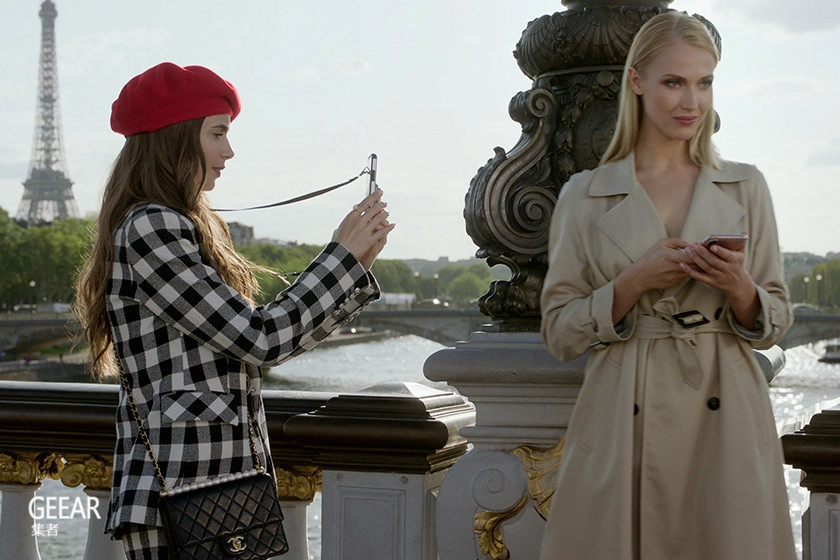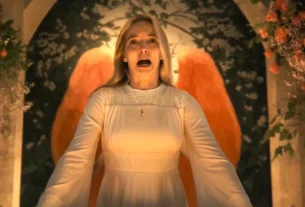Recently, there has been a bit of a drama, and I just hit this new Netflix series “Emily in Paris Season 1” starring “Snow White” Lily Collins.
“Emily in Paris Season 1” should be a romantic comedy tailored by Netflix for Lily Collins.
It is very consistent with the princess temperament that Lily Collins comes with, and they are all sweet chicks.

The plot of “Emily in Paris Season 1” is the same as the stills: simple without connotation, youth without loss of gorgeousness.
“Emily in Paris” has two meanings.
One is literally, that is, the life of the heroine Emily in Paris.
The other refers to Emily’s lg account, which is the tool she used to promote American marketing concepts in Paris, and Emily was successful.
After watching ten episodes in one go, apart from admiring the beauty of Lily Collins, I was full of new impressions of French culture and the city of Paris.

Oh, the French are too arrogant, Paris is a bit dirty, and the sanitation environment is worrying. It is possible to step on shit like Emily with just one foot.
It’s too dark French culture, isn’t there?
Is it true that when I arrive in Paris, I am always worried that a ball of baba will suddenly stick to my feet?
Hehe, don’t panic, viewers, this is just a consistent routine of American TV shows, and always loves to talk about culture.
Below, I will take you to take a look at the various cultural binary oppositions deliberately spoofed in “Emily in Paris Season 1.”
I promise you will have a different impression of “Emily in Paris Season 1” after reading it.
01 Progress and Conservation
Emily is a typical American girl. She is passionate and unrestrained, and enjoys work.
She was independent, pursuing her own career, and went to Paris from Chicago to work alone.

However, Emily’s boyfriend is unwilling to leave Chicago to go to Paris, even if he comes to see her in Paris.
Emily was disappointed, and she broke up immediately on the phone.
Isn’t it very decisive, is it in line with the expectations of an independent woman?
Contrary to her, the conservative French people sneered at her such excellent qualities as decisiveness and independence.
From the boss to the colleagues, Emily was ridiculed.

Emily invited the female boss to participate in her banquet, hoping that her boss would understand her in depth, but the other party’s refusal was straightforward.

When Emily told her French colleague in the office enthusiastically, her colleague was furious, thinking she wanted to destroy the French soul.
02 Sun and darkness
Sylvie, Emily’s female boss, looks vigorous and vigorous on the surface, but in fact she is the mistress of the company’s big customer Antoine.

Emily spoke a few more words with Antoine at the banquet, and Sylvie regarded him as an enemy for questioning.

Do you feel that Emily’s three views are a bit “surprising” compared to Sylvie, the boss who is a mistress.
The old man Antoine gave Emily a set of sexy underwear.

She is confused because she has no interest in married men.
She has always liked Gabriel, the handsome guy who lives downstairs, and the relationship between the two is very delicate.
In the last second, she leaped forward and offered a kiss.

In the next second, after learning that he had a girlfriend, Emily decided to give up on her own initiative and deliberately kept her distance from the handsome guy.

Seeing this, does it feel that Emily doesn’t look like an American woman who dares to act?
It doesn’t matter.
Because what the screenwriter wants everyone to see is this kind of contrast: an old French woman with three wrong outlooks, and a small American woman with three upright outlooks.
03 Bravery and Inferiority
Emily, an American girl who is alone in Paris, is very brave. If her boyfriend doesn’t want to come to Paris, she breaks up decisively.
The new professor’s boyfriend doesn’t eat fireworks, and he doesn’t want to watch “Swan Lake” with her, so he has to break up immediately.

It is difficult for customers to engage, and they are unwilling to cooperate with the company. She took the initiative and attacked in many ways, and if she couldn’t figure out herself, she would figure out his young heir.

In stark contrast to Emily’s bravery is her new girlfriend in France, a rich second-generation Chinese Mindy.
Mindy is the only daughter in the family. She has a dream of becoming a singer.
But because she was forced to marry by her parents and forced to inherit her career.
Mindy was unwilling to do so, and in the end she simply severed her relationship with her family. Currently, Mindy is working as a nanny in Paris by herself.
Compared with the brave girl Emily, the rich second-generation girl Mindy in China is undoubtedly inferior.
Although from the perspective of her personality, she is much better than Emily: she knows French, she knows French culture, and she has a lot of money at home.
However, Mindy is a girl who has no dreams, compared to Emily.

This is also the routine of American dramas and the epitome of American culture.
They like to be mentors and encourage others to follow their dreams freely, even if there are serious problems with this logical setting.

how to say?
American culture has an inherent sense of self-superiority.
Because of this sense of superiority, even a native girl from the United States who has never seen it in the world can save the soul of mankind.
As for the French who have been nourished by the ancient culture, China has become closed and conservative, unable to keep up with the trend of the times.
Concluding remarks
Any cultural work often unconsciously exposes the laughter of one’s own culture while belittling the culture of others.
“Emily in Paris Season 1” is no exception.
In addition to its spoof of Parisian culture and the stereotyped effect of Chinese culture, the American cultural values it presents are actually not very clever.
For example, the big star who needs to masturbate for fifteen minutes while lying on the sofa, taking drugs in the nightclub and taking the man back to the hotel to roll the sheets.
And Emily’s behavior itself is also a cultural contradiction.
On the surface, she is a symbol of the American spirit of freedom, preaching freedom and equality, working hard, and daring to love and hate.

In fact, all of Emily’s success and gains in the play depend on her youth and beauty.
Of course, there is also the good luck she brings because of her youth and beauty.
Emily’s private life is flooded enough.
Rough calculations, she rolled the sheets with at least four men in “Emily in Paris Season 1” (a professor, a seventeen-year-old boy, a neighbor, and an heir to luxury goods).
It’s not that it’s wrong to roll the sheets, but that I haven’t seen Emily have any special affection for anyone.
Emily is a little bit more affectionate except for her neighbors (but it’s not touching enough).

Others are based solely on physical needs, so Emily doesn’t seem to be a good girl either?
Isn’t this a mockery of the American culture of intemperance?
Of course, apart from the cultural slot, “Emily in Paris Season 1” is actually pretty good overall.
Simple and refreshing, beautiful and handsome guys are very seductive.
Haha, in the end, as an audience, just smile, and you don’t need to consider the others.
Who made this an age of entertainment to death?
Related Post: “Emily in Paris Season 2” exposure Date Announcement Teaser.



